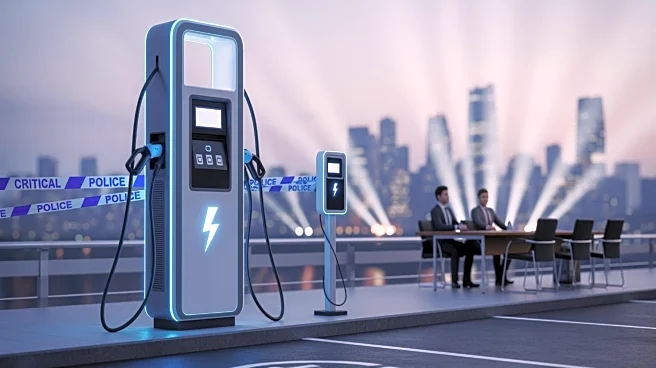What's Happening?
Electric vehicles (EVs) are often touted as a cost-effective alternative to traditional gasoline-powered cars, promising savings on fuel expenses. A detailed analysis has been conducted to determine whether
charging an EV is indeed cheaper than fueling a gas-powered vehicle. The study reveals that, on average, charging an EV is less expensive than filling up a gas tank. Using U.S. averages, the monthly cost of charging an EV is approximately $73, compared to $159 for gasoline. This calculation is based on driving 1,250 miles per month, with electricity costing 17.5 cents per kWh and gasoline priced at $3.18 per gallon. The analysis highlights that while electricity prices vary by location, they are generally lower than gasoline prices, making EV charging a more economical choice. However, the cost-effectiveness of EVs can be influenced by factors such as the type of charging (home vs. public) and local electricity rates.
Why It's Important?
The findings underscore the potential financial benefits of transitioning to electric vehicles, which could influence consumer decisions and accelerate the adoption of EVs in the U.S. As gasoline prices remain volatile, the stability and lower cost of electricity present a compelling case for EV ownership. This shift could have significant implications for the automotive industry, energy markets, and environmental policy. Reduced reliance on gasoline can decrease carbon emissions, contributing to climate change mitigation efforts. Additionally, the growth of EVs may drive investments in charging infrastructure and renewable energy sources, further transforming the energy landscape.
What's Next?
As the EV market continues to expand, further developments in charging technology and infrastructure are expected. Automakers and energy providers may offer incentives to encourage EV adoption, such as discounted charging rates or rebates for home charger installations. Policymakers could also play a role by implementing regulations and subsidies to support the transition to electric mobility. The ongoing evolution of battery technology and energy storage solutions may enhance the efficiency and affordability of EVs, making them more accessible to a broader range of consumers.
Beyond the Headlines
The shift towards electric vehicles raises important considerations regarding energy consumption and grid capacity. As more consumers opt for EVs, the demand for electricity will increase, necessitating upgrades to the power grid and investments in renewable energy sources. Additionally, the environmental impact of battery production and disposal must be addressed to ensure sustainable growth in the EV sector. These factors highlight the need for comprehensive strategies that balance economic, environmental, and technological aspects of the transition to electric mobility.









